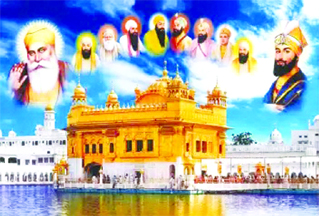By Dr Davinder Kaur Deep
What is religion? In simple words, religion is a set of values and principles which are to be practiced. It is not a verbal duel or a mental gymnastics. It is a duty we are to do while remaining in strict discipline. It is a way of living we are to adopt. In fact, religion means harmony. No religion surpasses the universal teachings of the Sikh Gurus who lay strong emphasis on the practice of its high principles. The Gurus, as is evident from their itineraries and teachings stood for humanity. Theirs is a religion of higher values and demands from its followers love, service and sacrifice to make the world a veritable paradise on the earth. Because it tells us how to live a righteous life and let others live the same: be good and do good to others: try to succeed and help others to attain success, struggle for justice for yourself and never do injustice to others. The best religion, according to the Guru, is: Of all religions, the best is to recite God’s name and do pious deeds. This is the Sikh religion.
What about harmony? It is an agreement in feelings. It is a pleasing interaction or appropriate combination of the elements in a whole. Nanak aimed to bring about harmony in a society that was divided along all kinds of lines and was filled with acrimony. At the young age of about thirty he went about spreading the message of humanity not only in India but in distant parts of the world too. At a time when the modern means of fast travel were unthinkable, he went on foot to places as far as Kabul, Baghdad, Mecca, Madina and Turkey in the West, China in the East and Sri Lanka in the South.
There were mainly three sects in India in Guru Nanak’s times: the Hindus, the Muslims and the Jogies. They had disregarded the vital principles of their religions and were indulging malpractices of all kinds of cheat, rob and mislead the masses. Guru Nanak was pained to see all this. He raised a powerful voice of protest against them, their false rituals and dogmatic principles. His message was a call for peace and love. His was a gospel of universal love and brotherhood. Guru Nanak sought to change all this. And it could be done only through persuasion and inspiration. He went about meeting people, discussing the concepts with all kinds of people he came across. He held religious debates and seminars with scholars and saints from different cults. He did succeed in his mission of directing them on the path of righteousness. He did his best to bring the Hindus and the Muslims together in unity by telling them that they all are the progeny of one God. He was against conversion and asked them to be good Hindus and good Muslims. Of Nanak’s two companions, one was a Hindu-Bala and the other was a Muslim – Mardana. Those were the times when the Hindus were divided among the high and the low castes. People of high castes looked down upon the people belonging to the lower castes and some were even treated as untouchables. Guru Nanak pointed out that it was not caste but good deeds that mattered: He said: One Lord is the father of all, and we the children of One Lord, Thou, O Lord, art Our Guru.
The Tenth Master stated: All men have the same eyes, the same ears, the same body, the same build, a compound of earth, air, fire and water: Allah and Abhekh are the same. They are alike; it is one God Who created all Thus, the Gurus laid the foundation of a casteless society, the salient feature of which was harmony. The institutions of congregation and common kitchen are of pivotal importance in Sikhism where all Sikhs are equals, sharing a common platform, sitting together, working together, praying together and dining together.
During Nanak’s period women were not treated as equals in society. They hardly had any rights. Guru Nanak declared that woman was the creator of kings and should not be considered inferior.
Guru Nanak spoke of emancipation and dignity of women in 15th & 16th centuries, at least two hundred years before a movement for emancipation of women got underway in Europe. High Character is another strong basis for harmony. In every religion, truth is considered to be the noblest virtue. But the Gurus said that while truth, no doubt, is high but higher still is truthful living. So, the Guru’s emphasis was on truthful and righteous living, practicing a precept not just preaching it. Thus, a Sikh has to be a man with a high moral character.
Gurbani recommends abstinence from all things that cause disharmony in personal life, family life and society. Consumption of liquor or other intoxicants which not only spoil health and material resources but cause disharmony has been prohibited by the Gurus.
The Sikh scripture Sri Guru Granth Sahib is the unique model of religious harmony in which the Bani of Bhagats of all sects in various dialects and languages is represented. There is no other parallel religious book of national and international integration in the world.
Let the younger generation of the Sikhs learn this one lesson from our Gurus and work for promoting harmony. Let them come forward to spread the gospel of the ten Nanaks and preserve their rich cultural and religious heritage.
(Republished with permission from Punjab Beat)
